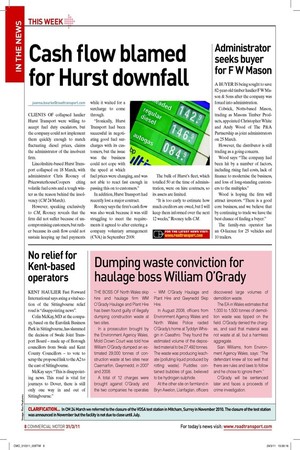Cash flow blamed for Hurst downfall
Page 7

If you've noticed an error in this article please click here to report it so we can fix it.
joanna.bourke@roadtransport.com
CLIENTS OF collapsed haulier Hurst Transport were willing to accept fuel duty escalators, but the company could not implement them quickly enough to match luctuating diesel prices, claims the administrator of the insolvent irm.
Lincolnshire-based Hurst Transport collapsed on 18 March, with administrator Chris Rooney of PricewaterhouseCoopers citing volatile fuel costs and a tough winter as the reason behind the insolvency (CM 24 March).
However, speaking exclusively to CM, Rooney reveals that the irm did not suffer because of uncompromising customers, but rather because its cash low could not sustain keeping up fuel payments
while it waited for a surcharge to come through.
“Ironically, Hurst Transport had been successful in negotiating good fuel surcharges with its customers, but the issue was the business could not cope with the speed at which fuel prices were changing, and was not able to react fast enough in passing this on to customers.” In addition, Hurst Transport had recently lost a major contract.
Rooney says the irm’s cash low was also weak because it was still struggling to meet the requirements it agreed to after entering a company voluntary arrangement (CVA) in September 2009. The bulk of Hurst’s leet, which totalled 50 at the time of administration, were on hire contracts, so its assets are limited.
“It is too early to estimate how much creditors are owed, but I will keep them informed over the next 12 weeks,” Rooney tells CM.









































